I’ve been thinking a lot these days about Henry David Thoreau. This isn’t unusual: Thoreau is one of my favorite authors, and I spent a good deal of my doctoral dissertation analyzing his writing. I have a whimsical portrait of Thoreau over my desk because he represents many of the things I personally hold dear: he was a writer and a naturalist, a walker and a rebel. In a world insistent upon choosing sides, Thoreau was both an artist and a scientist, both poetic and political, both active and contemplative. When I try to imagine a well-rounded, grounded, and self-reliant person, Thoreau is who immediately comes to mind.
I’ve been thinking more than usual these days about Henry David Thoreau because of “Civil Disobedience,” an essay published in 1849 that inspired both Gandhi and Dr. Martin Luther King, and “Slavery in Massachusetts,” a lesser-known essay that Thoreau first delivered as a lecture in Framingham on July 4, 1854, after escaped slave Anthony Burns was captured in Boston and sent back south. In “Civil Disobedience,” Thoreau describes the night he spent in jail after refusing to pay his poll tax as a protest against the Mexican War and its expansion of slavery, and in “Slavery in Massachusetts,” he condemns Northern cooperation with the Fugitive Slave Act. In both essays, Thoreau turns his eye with all its acuity on the social ills of his day, as if politics were no less interesting than natural history. This politically engaged way of looking at the world seems particularly helpful in 2017, exactly two centuries after Thoreau was born.
Although the popular image of Thoreau is that of a quiet misanthrope twiddling his thumbs alongside a peaceful pond, Thoreau was outspoken during the most politically tumultuous time in American history. When Thoreau wrote “Civil Disobedience” and “Slavery in Massachusetts,” the political debate over slavery was ratcheting the nation toward civil war, and Thoreau was deeply engaged in that debate. Thoreau didn’t just sit back and ignore the political issues of his day; although he cherished his solitude, Thoreau wasn’t an escapist. Instead, Thoreau figured out how to balance engagement and renewal, speaking out on political issues as he was able, but also finding time to unplug.
Ever since the election, I’ve been spending a lot of time following news coverage and political commentary on Trump, Trumpism, and the burgeoning resistance to both. There has been a surge on the left of people trying to learn and understand everything from the demographics of the white working class to constitutional law and immigration policy. While folks on the right raced to buy guns when Obama was elected, folks on the left are now racing to read books. Unlike Trump supporters who shield themselves from “fake news” by plugging their ears to any coverage that doesn’t come straight from the President himself, people on the other side of the political divide have been reading widely and deeply, seeking multiple perspectives in an attempt to stay informed.
This attempt to stay informed, however, can get tiring: sometimes I envy the quiet complacency of the right, who can sit back and trust that America will magically become Great now that Trump is in charge. Had Hillary Clinton won the election, I would have presumably done the same, patting myself on the back for doing my civic duty at the ballot box and considering my job as a citizen to be over. Since the election, however, I find myself moonlighting as an activist, keeping a constant eye on breaking news, receiving daily text messages and emails urging me to contact elected officials on the issue du jour, and otherwise staying vigilant, ready to cancel plans and rush off to protest the latest executive order, unsettling tweet, or constitutional crisis.
In the aftermath of 9/11, people quickly learned that you can’t remain on high alert forever, but that doesn’t mean you should let yourself be lulled to sleep. Beth recently wrote about self-care during the resistance: if you plan to be an effective activist in the long run, you have to prioritize and pick your battles. This is, again, where I find Thoreau to be particularly inspiring. Thoreau spoke out against slavery, the Mexican War, and other political outrages of his day, but he also managed to take daily walks, write in his journal, keep a careful chronicle of wild flora and fauna, and tend his garden. Thoreau, in other worlds, figured out a way to simultaneously exist and resist.
What Thoreau didn’t do, of course, was stay inside glued to either CNN or his Facebook feed: instead, he was outside and active. A lot of modern-day critics of Thoreau argue (rightfully) that his activism was largely symbolic: the single night in jail Thoreau describes in “Civil Disobedience” didn’t single-handedly bring down slavery. But just because an act of protest is symbolic doesn’t mean it is isn’t powerful, as many of the accoutrements of power are themselves symbolic.
Donald Trump didn’t magically become a different man when he raised his hand and took the oath of office, but that symbolic action marked a monumental transition of power. Some of the most alarming news items these days stem not from official policy Trump and his administration has enacted, but the tone-setting influence of angry rants and recklessly worded tweets. Words are nothing more than symbols, but that doesn’t mean words don’t matter.
By writing about his night in jail, Thoreau preserved it for the ages, reminding generation after generation that “under a government which imprisons unjustly, the true place for a just man is also a prison.” The concept of civil disobedience–Thoreau’s insistence that the government is a machine, and private citizens can strip government of its power by intentionally becoming a “counter-friction to stop the machine”–is not new or earth-shattering: had Thoreau not written “Civil Disobedience,” both King and Gandhi would have found inspiration elsewhere.
But the fact remains that Thoreau did write this essay: he planted a seed. The tree of peaceful protest would have found some other method of germination had Thoreau never tended it, but he was a faithful servant in freedom’s garden. A solitary and sometimes cantankerous man, Thoreau probably never envisioned the communal movements that both King and Gandhi led: what started as one man spending one night in jail has inspired massive collective movements that have changed the world. Even the largest earthquake starts with a tiny tremor.
History is neither a marathon or sprint; instead, history is a relay race. Thoreau did nothing more than pick up the baton of justice and pass it on, and we should expect nothing less of ourselves. It’s important to show up–to engage in faithful, regular deeds, even if those deeds are small–as a way of claiming our priorities. It is not necessary to do everything, but do not fail to do something. As you are able, act. If you cannot act, speak up; if you cannot speak up, listen. If you can neither act, speak up, nor listen, by all means pray. Remain faithful in small things, and trust your acts will be echoed by others, achieving a cumulative effect. We’re in this for the long haul, and there is a need for all sorts of acts and activism.
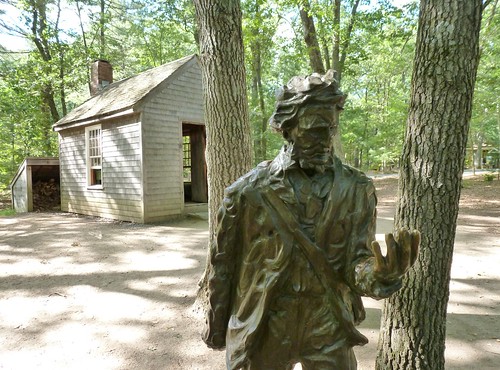
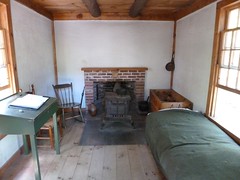
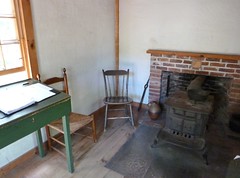

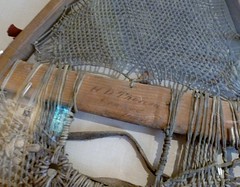
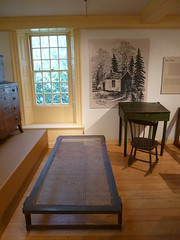
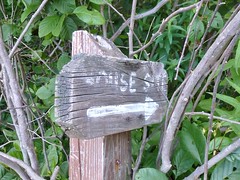

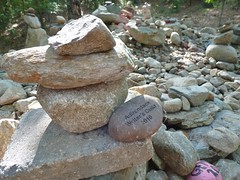
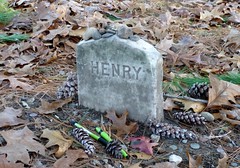
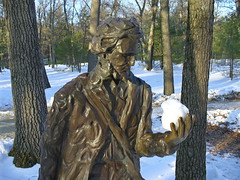
Mar 16, 2017 at 10:33 pm
Thanks so much! Thoreau is a favorite of mine as well.
LikeLiked by 1 person
Mar 17, 2017 at 5:33 am
Reblogged this on Elisabeth Yosephine and commented:
“It’s important to show up–to engage in faithful, regular deeds, even if those deeds are small–as a way of claiming our priorities. It is not necessary to do everything, but do not fail to do something. As you are able, act. If you cannot act, speak up; if you cannot speak up, listen. If you can neither act, speak up, nor listen, by all means pray. Remain faithful in small things, and trust your acts will be echoed by others, achieving a cumulative effect. We’re in this for the long haul, and there is a need for all sorts of acts and activism.”
Beautiful :”)
LikeLiked by 2 people